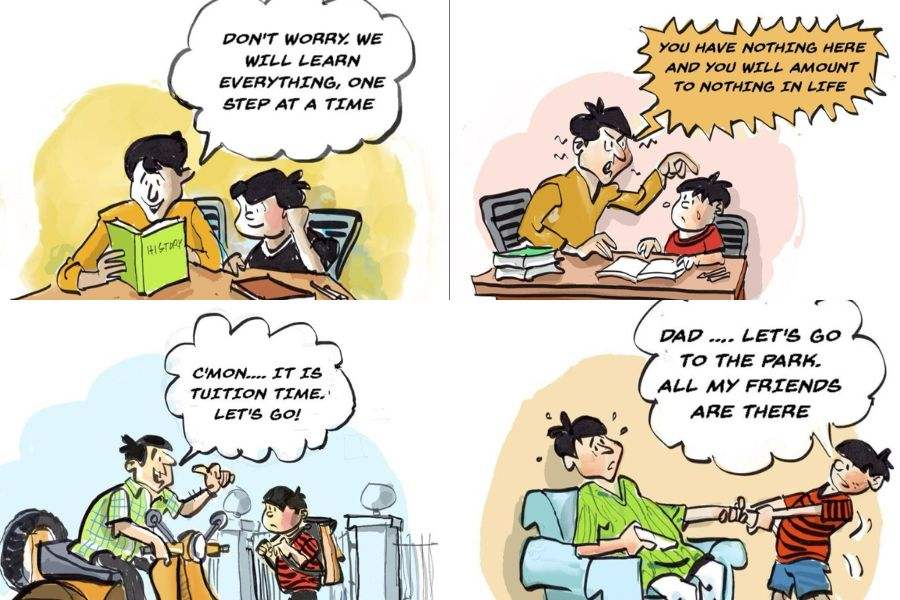Some men say their fathers used the rod on them liberally. Others spent their childhood trying to live up to their fathers’ expectations but the dads were never satisfied. The distance in their relationship remains and they claim to love the father only out of a sense of duty now.
At a Fathers’ Day seminar on Sunday, experts shed light on the wrongs that fathers can set right, so they bring up confident children and build strong and trusting relationships with their children.
The meet was organised by the NGO Initiative for Scientific and Public Awareness Target (Ispat) and Ayushman Charitable Trust. The speakers were Barnali Ghosh, psychologist of the IB Block Manipal Hospitals, and Samar Kumar Mondal, a professor of philosophy who is the co-ordinator of the psychological counseling centre at Jadavpur University. Secretary of Ispat, Ritesh Basak informed that they had also held a rally around Karunamoyee that morning.
“A parent’s role in shaping a child is largely gender neutral yet mothers give birth and provide food and warmth in the early days. Fathers have traditionally been the primary breadwinners, often away from home and thus logistically distanced from the child. But for emotional stability and security, a child needs both parents,” said Ghosh.
Mondal stated that the surge in cases of children with anxiety, depression, insubordination etc. stems from poor parenting.
Here are some of the tips, shared by Ghosh -
Attention- Children thrive on attention, especially when they feel extreme highs or lows. Parents often complain about attention-seeking or manipulative behavior in kids. Well, remember this as a formula —if a child seeks negative attention, it means they’re not getting positive attention. You don’t look at the child when he sits to draw quietly, so he breaks a vase, sure that he will get your attention.
Appreciation - I once complimented a girl on her nail polish but her mother told me off, fearing it would go to her head. This isn’t true. It isn’t only negative feedback that kids learn from. If they are appreciated, they feel encouraged to repeat good behaviour.
Umpteen children struggle to complete 15 sums, only to be shunned by a father who points out that the neighbour’s child did 50. These kids lose confidence because their parents are dissatisfied.
But appreciation doesn’t mean giving them a false sense of self. If your kid can barely sing don’t talk of signing him up at reality TV shows.
Affection– Children need age-appropriate warmth and affection. Embrace an infant, but speak lovingly to a teenager. This fosters emotional stability. Affection doesn’t mean giving him a black eye when angry and smothering him with hugs afterward. Such kids become insecure, always fearing the next outburst. They may obey you, but out of fear.
In any case, hitting may get temporary results but at the cost of imbibing fear, anger, and hatred in the child and may lead to further defiance, anger outbursts, verbal abuse, and violence, depending on the age. Disciplining through occasional smacks, or light spanking in places that don’t hurt much (hand, thigh, back) is still acceptable. You mustn’t demean the child.
Let them play– Some parents prefer structured play, like sports coaching, but there’s no substitute for free play. I know an eight-year-old who was removed from the BF Block swimming pool and enrolled at the Sports Authority of India (SAI) because her mother found her “wasting time” chatting in the BF pool.
When I spoke to the child it turned out the girl would chat after swimming 20 laps. And in any case, there is a genuine need to mingle with friends. Not everything needs to be result-oriented.
Parents move mountains to ensure their child reaches tuition on time, but when it comes to playtime, they offer excuses like: “There’s no one his age nearby to play with.” No wonder children often mention being bored in my sessions. Tell this to parents, and they promptly hire more tutors!
Studying without playing is like eating without digesting. Even at top US colleges like MIT, sports, music, or creative classes are mandatory alongside technical courses.

Illustrations: Pratik Chakrabarti
Choose the right toys- Girls are allowed to play with anything, but most parents give boys Meccano sets, puzzles, guns, and cars, believing boys must excel in problem-solving and critical thinking. Girls, meanwhile, get dolls, kitchen, or garden sets.
So when fathers struggle to express emotions, it’s often because their emotional range was limited in childhood, even during playtime. This is why brilliant IIT-ians can be emotionally fragile and succumb to suicide.
Let him make friends – This is his baseline interaction with the outside world, teaching him adjustment and communication skills. But parents often interfere, brainwashing kids to befriend only good students and avoid the others. This teaches them that relationships should be need-based and that they should be opportunists, which keeps them from forging genuine friendships later.
Connect them with nature – This is a basic need. Don’t scold him for staring at the sky; it fuels his imagination. Show your babies the sky from the window. If your child naps in the afternoon, don’t draw the curtains to block the sunlight. Let him learn the difference between night and day.
Sleep tight- Sleep disorders are now at pandemic levels due to digital dependence, isolation, and indiscipline. It’s not just about sleep duration but also aligning sleep patterns with the body clock. It’s not healthy to sleep from 3am to 11am.
I know of a four-year-old who was taken to a horror movie at 11pm because it suited the parents. They claimed it was harmless as the child was too young to understand anything but this was exactly the problem. The child’s sleep cycle was disrupted, and the disturbing sounds and visuals scared him. Such irresponsible parenting can make children clingy, give them nightmares, and cause bedwetting.
Appreciate the mother- She may be a victim of stereotypes too, cooking and cleaning without enjoying it. The child needs to see parents respect and appreciate each other’s efforts.
Don’t fight in front of him– while some amount of arguing is unavoidable in families, do not expose your child to them and do not make him take sides. Often if say, the father is angry at the mother, he vents to the child, accusing and abusing her. This torments the child as it’s his mother he is accusing.
Communicate directly– Many mothers are guilty of saying: “Wait till your dad hears about this! I don’t mind, but your dad will be furious.” Such threats shape the child’s perception of the father and affect their relationship, without the father having a clue.
Criticise constructively- “You are worthless! You have cowdung in your head! Why don’t you just die!” Such personal attacks will do no good if your child has failed an exam, but will destroy his confidence further.
Criticize the behaviour, not the person. Avoid sarcasm and pinpoint where he went wrong so he can improve. Appreciate him, and not only his achievements. Focus on the process and not outcome.
Don’t use irrational threats- If your child refuses to eat, don’t threaten to hand him over to monsters or the police. It will lead to fear, anxiety, and superstition. Rather, explain why nutrition is important.
Digital addiction- “It is parents who hand the phone to kids in the first place when they are too busy to give them time. But it’s an idiot box only if you watch trash on it,” said Mondal. “There’s no harm if he’s using it for studies. And if he’s endlessly scrolling, then he’s trying to relieve stress, that needs to be attended to separately.”
Mondal asked parents to boost kids’ confidence by asking them to perform simple tasks like fetching a glass of water. “Empower them by including them in household decision-making. If a new fridge is to be bought, ask him to choose the colour. Be strict but fair and respectful,” he said.
